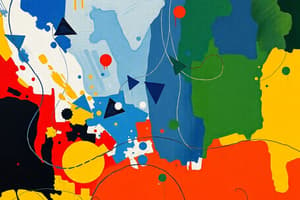Podcast
Questions and Answers
Which key figure is associated with analytic philosophy?
Which key figure is associated with analytic philosophy?
What does pragmatism emphasize in relation to ideas?
What does pragmatism emphasize in relation to ideas?
Which philosophical movement is closely tied to themes of absurdity and angst?
Which philosophical movement is closely tied to themes of absurdity and angst?
What is a primary focus of metaphysics?
What is a primary focus of metaphysics?
Signup and view all the answers
Which of the following philosophies includes a strong emphasis on historical context?
Which of the following philosophies includes a strong emphasis on historical context?
Signup and view all the answers
Which term is associated with the method of 'bracketing' assumptions?
Which term is associated with the method of 'bracketing' assumptions?
Signup and view all the answers
What is the primary concern of critical theory?
What is the primary concern of critical theory?
Signup and view all the answers
Which philosophical approach questions grand narratives and universal truths?
Which philosophical approach questions grand narratives and universal truths?
Signup and view all the answers
Study Notes
Analytic Philosophy
- Focuses on clarity and argumentation.
- Emphasizes language analysis and logical form.
- Key figures: Bertrand Russell, Ludwig Wittgenstein, Willard Van Orman Quine.
- Often addresses issues in science, mathematics, and meaning.
Continental Philosophy
- Encompasses a wide variety of philosophical traditions from mainland Europe.
- Concerned with human experience, subjectivity, and historical context.
- Key figures: Jean-Paul Sartre, Martin Heidegger, Simone de Beauvoir.
- Includes movements like existentialism, phenomenology, and post-structuralism.
Pragmatism
- Centers on practical consequences as the basis for meaning and truth.
- Sees ideas as tools for action, not as static entities.
- Key figures: Charles Sanders Peirce, William James, John Dewey.
- Emphasizes the importance of context and experience.
Eastern Philosophy
- Encompasses various traditions such as Taoism, Buddhism, Confucianism, and Hinduism.
- Focuses on concepts of balance, harmony, and the nature of existence.
- Often emphasizes ethics, meditation, and the nature of reality.
Existentialism
- Stresses individual freedom, choice, and subjective experience.
- Addresses themes of absurdity, angst, and authenticity.
- Key figures: Søren Kierkegaard, Friedrich Nietzsche, Albert Camus.
- Critiques traditional systems of meaning and moral authority.
Metaphysics
- Explores fundamental questions about existence, reality, and the universe.
- Includes discussions on topics like being, time, space, and causality.
- Engages with ontological and epistemological issues.
Ethics
- Investigates moral values, principles, and decision-making.
- Subfields include normative ethics, meta-ethics, and applied ethics.
- Key theories: deontology, consequentialism, virtue ethics.
Phenomenology
- Focuses on structures of experience and consciousness.
- Aims to describe phenomena as they appear in experience.
- Key figures: Edmund Husserl, Maurice Merleau-Ponty.
- Method involves "bracketing" assumptions and preconceptions.
Critical Theory
- Examines society, culture, and power structures.
- Seeks to critique and change society, not just understand it.
- Associated with the Frankfurt School and thinkers like Theodor Adorno and Max Horkheimer.
- Emphasizes the interplay between ideology, culture, and politics.
Postmodernism
- Questions grand narratives and universal truths.
- Emphasizes relativism, subjectivity, and fragmentation.
- Key figures: Jacques Derrida, Michel Foucault, Jean-François Lyotard.
- Challenges established norms and categories in philosophy and culture.
Analytic Philosophy
- Focuses on clarity and argumentation, often using logic and language analysis to clarify meaning.
- Key figures include: Bertrand Russell - known for logic and the foundations of mathematics, Ludwig Wittgenstein - for his focus on language and meaning, and Willard Van Orman Quine - for his contributions to logic, philosophy of science, and semantics.
- Often addresses issues in science, mathematics, and meaning such as the nature of knowledge, the meaning of words, and the relationship between language and reality.
Continental Philosophy
- Encompasses a wide range of philosophical traditions from mainland Europe, focusing on the human experience and the historical context of thought.
- Key figures include Jean-Paul Sartre - known for existentialism, Martin Heidegger - for his work on existentialism and phenomenology, and Simone de Beauvoir - for her feminist philosophy and existentialist writings.
- Includes movements like existentialism, phenomenology, and post-structuralism, exploring the relationship between being and existence, the nature of consciousness, and the power structures in society.
Pragmatism
- Centers on practical consequences and how they relate to meaning and truth.
- Key figures include Charles Sanders Peirce - the founder of pragmatism, William James - known for his work on psychology and philosophy, and John Dewey - for his contributions to education and philosophy.
- Views ideas as tools for problem-solving and emphasizes the importance of context and experience.
Eastern Philosophy
- Encompasses various traditions such as Taoism, Buddhism, Confucianism, and Hinduism, focusing on concepts of balance, harmony, and the nature of existence.
- Oftentimes emphasizes ethics, meditation, and the nature of reality.
Existentialism
- Emphasizes individual freedom, choice, and subjective experience.
- Key figures include Søren Kierkegaard - the "father of existentialism", Friedrich Nietzsche - known for his critique of traditional morality, and Albert Camus - for his absurdist philosophy.
- Addresses themes of absurdity, angst, and authenticity, criticizing traditional systems of meaning and moral authority.
Metaphysics
- Explores fundamental questions about existence, reality, and the universe, including discussions on the nature of being, time, space, and causality.
- Engages with ontological and epistemological issues.
- Ontological questions explore the nature of being and existence, while epistemological questions delve into the nature of knowledge and how we know what we know.
Ethics
- Investigates moral values, principles, and decision-making.
- Subfields include normative ethics - which studies moral principles and rules, meta-ethics - which investigates the nature of morality, and applied ethics - which applies moral principles to real-world issues.
- Key ethical theories include deontology - which emphasizes duty and moral rules, consequentialism - which focuses on outcomes and consequences, and virtue ethics - which emphasizes character traits and moral virtues.
Phenomenology
- Focuses on structures of experience and consciousness.
- Aims to describe phenomena as they appear in experience.
- Key figures include Edmund Husserl - the founder of phenomenology, and Maurice Merleau-Ponty - known for his work on perception and embodiment.
- Method involves "bracketing" assumptions and preconceptions to arrive at a pure, unprejudiced understanding of experience.
Critical Theory
- Examines society, culture, and power structures critically, seeking to critique and change society, not just understand it.
- Associated with the Frankfurt School and thinkers like Theodor Adorno - known for his work on culture and ideology, and Max Horkheimer - for his contributions to critical theory and social theory.
- Emphasizes the interplay between ideology, culture, and politics.
Postmodernism
- Questions grand narratives and universal truths, emphasizing relativism, subjectivity, and fragmentation.
- Key figures include Jacques Derrida - known for his deconstructionist philosophy, Michel Foucault - for his analysis of power and knowledge, and Jean-François Lyotard - for his work on postmodernism and the decline of narratives.
- Challenges established norms and categories in philosophy and culture.
Studying That Suits You
Use AI to generate personalized quizzes and flashcards to suit your learning preferences.
Description
Explore the fundamental schools of philosophy, including Analytic, Continental, Pragmatism, and Eastern thought. Each section highlights key figures, major themes, and the significance of their ideas in understanding human experience and meaning. Test your knowledge of these diverse philosophical traditions.




